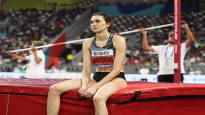According to the president of the International Association of Athletics Federations, Sebastian Coe, Russian and Belarusian athletes are not returning to international competitions in the near future.
Superstar of the women’s high jump Maria Lasitskene achieved the first outdoor track gold medal of his career at the World Championships in Beijing in 2015. Since then, the Russian has been undefeated in prestigious competitions: in addition to three consecutive world championships, Lasitskene is the European champion from 2018 and the Olympic champion from last year.
There would probably be two extra gold medals in the trophy cabinet, but the International Olympic Committee and the Athletics Federation denied him the right to participate in the 2016 European Championships and the Olympics. Lasitskene lost his competition rights when Russia’s state doping program was revealed earlier that year. Lasitskene has not given a positive doping sample in his career.
This year, the same fate happened again. This time too, the reason was found in the Russian leadership, on whose orders the country’s military forces attacked Ukraine at the end of February with the help of Belarus. The war, which claimed tens of thousands of victims, is still going on, and the Russian army has carried out numerous devastating attacks on civilian targets.
In the spring, the International Olympic Committee (IOC) urged its sports federations to exclude Russian and Belarusian athletes from their competitions, and the International Athletics Federation World Athletics implemented the ban.
At the beginning of June, Lasitskene approached the chairman of the IOC with an open letter, in which he made it clear that he was against his country’s military actions, but emphasized that athletes could not be held responsible for political events. The Russian jumper also remembered the chairman of WA in the letter Sebastian Coeta about the events of 2016.
“I remember very well how you did not want to address the fact that IOC member Sebastian Coe did not allow me to participate in the 2016 Olympics simply because I was born in Russia,” Lasitskene, 29, wrote.
Urheilu asked Coe at Hayward Field what kind of message he would like to convey to Lasitskene.
– I would tell him that integrity is very important in sports. We want to make sure that all athletes could participate in the Games. However, it is not possible for Ukrainians. They are moving with a historically small team, because many of the athletes who belong here have to defend their country. Now the team has athletes who take care of their coach and their families.
– It would have been incomprehensible, completely incomprehensible, if we had allowed the Russians and Belarusians to be able to compete unhindered, when it was simply not possible for the Ukrainians. This is about integrity, says Coe.
During the World Championships in Oregon, Coe faced Ukraine’s 22-man squad, which is considerably smaller than usual. Three years ago, 41 athletes competed in the Ukrainian team at the World Championships in Doha.
– We had a very private meeting in the warm-up area. I told them I was humble. Their country is facing unimaginable pain and suffering. I told them that I was grateful that they had come, and assured them that we would continue to support them during my presidency of this union.
Coe, 65, does not give a straight answer as to what would have to happen for the return of Russians and Belarusians to be considered.
– I’m not a politician. I should be completely satisfied with the integrity, i.e. the fact that the opportunity for Ukrainians to participate in the competitions has not been compromised. With these games and the near future in mind, our federation decided that Russians and Belarusians are not allowed to participate in our competitions.
Russian athletes have continued to compete in their home country, where only the Russian Anti-Doping Commission Rusada could answer for their doping testing. However, it has not yet regained the trust of the international sports community, but its position has been under constant evaluation even before the war of aggression started by Russia. Since then, Russian athletes have been out of reach of international testing activities.
Normally, when athletes are not in a test pool that meets international criteria, they cannot return to competition without a quarantine. For example, athletes returning from retirement are subject to a six-month quarantine.
Coe dodges the question of whether he would apply the quarantine policy to the return of Russian athletes, instead placing responsibility primarily on the International Association of Athletics Federations’ independent anti-doping body, the Athletics Integrity Unit, established in 2016.
– I have strong faith in AIU’s ability to guide the union on this issue, Coe says.
